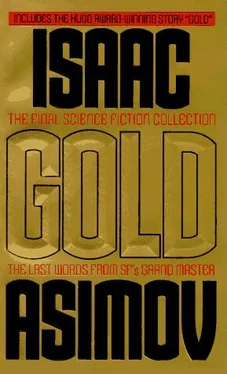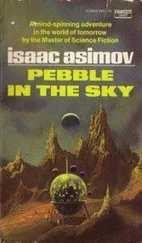Isaac Asimov - Gold - The Final Science Fiction Collection
Здесь есть возможность читать онлайн «Isaac Asimov - Gold - The Final Science Fiction Collection» весь текст электронной книги совершенно бесплатно (целиком полную версию без сокращений). В некоторых случаях можно слушать аудио, скачать через торрент в формате fb2 и присутствует краткое содержание. Год выпуска: 2003, ISBN: 2003, Издательство: Eos, Жанр: Фантастика и фэнтези, на английском языке. Описание произведения, (предисловие) а так же отзывы посетителей доступны на портале библиотеки ЛибКат.
- Название:Gold: The Final Science Fiction Collection
- Автор:
- Издательство:Eos
- Жанр:
- Год:2003
- ISBN:ISBN: 0-060-55652-8
- Рейтинг книги:3 / 5. Голосов: 1
-
Избранное:Добавить в избранное
- Отзывы:
-
Ваша оценка:
- 60
- 1
- 2
- 3
- 4
- 5
Gold: The Final Science Fiction Collection: краткое содержание, описание и аннотация
Предлагаем к чтению аннотацию, описание, краткое содержание или предисловие (зависит от того, что написал сам автор книги «Gold: The Final Science Fiction Collection»). Если вы не нашли необходимую информацию о книге — напишите в комментариях, мы постараемся отыскать её.
Gold: The Final Science Fiction Collection — читать онлайн бесплатно полную книгу (весь текст) целиком
Ниже представлен текст книги, разбитый по страницам. Система сохранения места последней прочитанной страницы, позволяет с удобством читать онлайн бесплатно книгу «Gold: The Final Science Fiction Collection», без необходимости каждый раз заново искать на чём Вы остановились. Поставьте закладку, и сможете в любой момент перейти на страницу, на которой закончили чтение.
Интервал:
Закладка:
By the time he was eighteen, Alexander had established an information-handling business for students and small businessmen and had become self-supporting. He moved into his own apartment in the city and was from that point on independent of his parents.
In his own apartment he could remove the earphone attachment. With privacy, he could speak to Bucephalus openly, though he carefully adjusted the computer’s voice to low intensity. He did not want neighbors to wonder who was in the apartment with him.
He said, “Bucephalus, Alexander the Great had conquered the ancient world by the time he was thirty. I want to do the same thing. That gives me twelve more years.”
Bucephalus knew all about Alexander the Great, since the Encyclopedia had given him all the details.
He said, “ Alexander the Great was the son of the King of Macedon and by the time he was your age, he had led his father’s cavalry to victory at the great battle at Chaeronea.”
Alexander said, “No, no. I’m not talking about battles and phalanxes and things like that. I want to conquer the world by coming to own it.”
“How could you own it, Alexander?”
“You and I, Bucephalus,” said Alexander, “are going to study the stock market.”
The New York Times had long since put all its microfilmed records into computerized form and for
Alexander it was not at all a difficult task to tap into that information.
For days, weeks, months, Bucephalus transferred over a century of data on the stock market into its own memory banks-all the stocks listed, all the shares sold for each on each day, the ups and downs, even the applicable news on the financial pages. Alexander was forced to extend the computer’s memory circuits and to work out a daring new system for information retrieval. Reluctantly, he sold a simplified version of one of the circuits he had developed to IBM and in this way became quite well-to-do. He bought a neighboring apartment in which he might eat and sleep. The first apartment was now given over entirely to Bucephalus.
When he was twenty, Alexander felt he was ready to start his campaign.
“Bucephalus,” he said, “I am ready, and so are you. You know everything there is to know about the stock market. You have in your memory every transaction and every event, and you keep it all up to date to the very second because you are hooked into the computer at the New York Stock Exchange, and you will soon be hooked into the exchanges in London, Tokyo, and elsewhere.”
“Yes, Alexander,” said Bucephalus, “but what is it you wish me to do with all the information?”
“I am certain,” said Alexander, his eyes gleaming in steely, determined fashion, “that the values and fluctuations of the Market are not random. I feel that nothing is. You must go through all the data, studying all the values and all the changes in the values and all the rates of changes of the values, until you can analyze them into cycles and combinations of cycles.”
“Are you referring to a Fourier analysis?” asked Bucephalus. “Explain that to me.”
Bucephalus presented him with a printout from the Encyclopedia together with supplements from other information in his memory banks.
Alexander glanced at it briefly, and said, “Yes, that’s the sort of thing.” “To what end, Alexander?”
“Once you have the cycles, Bucephalus, you will be able to predict the course of the stock market in the following day, week, month, according to the swing of the cycles, and you will be able to direct me in my investments. I will quickly grow rich. You will also direct me how to obscure my own involvement so that the world will not know how rich I am, or who it is who has such an influential finger on world events.”
“To what end, Alexander?”
“So that when I am rich enough, when I control the Earth’s financial institutions, its commerce, its business, its resources, I will have done in reality what Alexander the Great did only in part. I will be Alexander the Really Great. “ His eyes glittered with delight at the thought.
By the time Alexander was twenty-two, he was satisfied that Bucephalus had worked out the complicated set of cycles that would serve to predict the behavior of the stock market.
Bucephalus was less certain. He said, “In addition to the natural cycles that control such things, there are also unpredictable events in the world of politics and international affairs. There are unpredictable turns of weather, disease, and scientific advance.”
Alexander said, “Not at all, Bucephalus. All such things also go in cycles. You will study the general news columns of the New York Times and absorb it all in order to allow for these supposedly unpredictable events. You will then find they are predictable. Other great newspapers, here and abroad, will be yours to study. They are all microfilmed and computerized and we can go back for a century or more. Besides, you do not have to be totally accurate. If you are right eighty-five percent of the time, that will do, for now.”
It did do. When Bucephalus felt that the stock market would go up or that it would go down, he was invariably right. When he pointed to particular stocks that were headed for long-term rises or declines, he was almost always right.
By the time Alexander was twenty-four he was worth five million dollars and his income had risen to tens of thousands of dollars per day. What’s more, his books were so complicated and the money so laundered that it would have taken another computer just like Bucephalus to track it all down and force Alexander to pay more than a pittance to the I.R.S.
It was not even difficult. Bucephalus had entered all the tax statutes into its memory as well as a score of textbooks on corporation management. Thanks to Bucephalus, Alexander controlled a dozen corporations without any sign of that control being visible.
Bucephalus said, “ Are you rich enough, Alexander?”
“Surely you jest,” said Alexander. “I am as yet a financial pipsqueak, a batboy in the minor leagues. When I am a billionaire, I will be a power in the financial set, but I will still be only one among a handful. It is only when I am a multitrillionaire that I will be able to control governments and force my will upon the world. And I have only six years left.”
Bucephalus’s understanding of the stock market, and of the ways of the world, grew each year.
His advice remained always useful and his deviousness in threading financial tentacles through the centers of world power remained always skillful.
Yet he grew doubtful, too. “There may be trouble, Alexander,” he said. “Nonsense,” said Alexander. “ Alexander the Really Great cannot be stopped.”
By the time Alexander was twenty-six, he was a billionaire. The entire apartment building was now his and all of it was given over to Bucephalus, and to all the offshoots of its enormous memory. The tentacles of Bucephalus now stretched invisibly outward to all the computers in the world. Softly, gently, all of them responded to Alexander’s will as expressed through Bucephalus.
Bucephalus said, “It grows more difficult somehow, Alexander. My estimates of future development are not as good as they have been.”
Alexander said impatiently, “You are dealing with more and more variables. There is nothing to worry about. I shall double your complexity, then double it again.”
“It is not complexity that is needed,” said Bucephalus. “ All the cycles that I have worked out in ever-increasing complexity predict the future in fine detail only because things that now take place are the same as have taken place in the past, so that the response is the same. If something entirely new happens, then all the cycles will fail-”
Читать дальшеИнтервал:
Закладка:
Похожие книги на «Gold: The Final Science Fiction Collection»
Представляем Вашему вниманию похожие книги на «Gold: The Final Science Fiction Collection» списком для выбора. Мы отобрали схожую по названию и смыслу литературу в надежде предоставить читателям больше вариантов отыскать новые, интересные, ещё непрочитанные произведения.
Обсуждение, отзывы о книге «Gold: The Final Science Fiction Collection» и просто собственные мнения читателей. Оставьте ваши комментарии, напишите, что Вы думаете о произведении, его смысле или главных героях. Укажите что конкретно понравилось, а что нет, и почему Вы так считаете.











